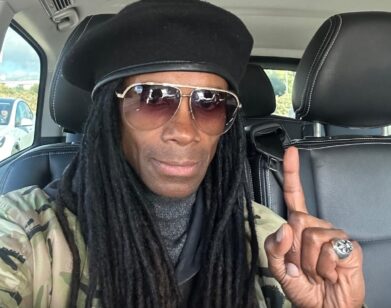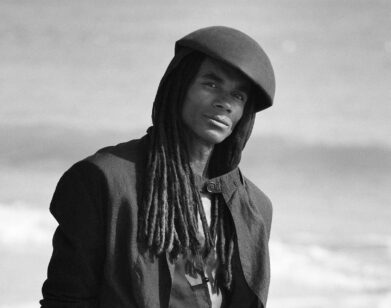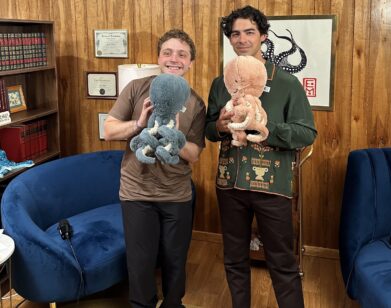The Birth of Saint Rich

ABOVE: SAINT RICH. PHOTO COURTESY OF KYLE DEAN REINFORD.
Leaving the forefront of Delicate Steve in pursuit of a fresh project, Steve Marion and Christian Peslak have united under the name Saint Rich. Fans of Delicate Steve, be forewarned: Saint Rich introduces not only lyrics, but also a clean unique sound, greatly differing from Delicate Steve’s purely instrumental experimentation. Peslak’s deep and natural vocals create an indie-rock-meets-folk aesthetic for their debut album, Beyond the Drone.
After receiving a recommendation from a mutual friend, Marion approached the now 21-year-old Peslak before he graduated high school and invited him to play with Delicate Steve’s touring band. When a storm prevented rehearsal one day, the two assumed new roles and Saint Rich was born.
We caught the talented duo in Seattle between shows, where we discovered how the humble roots of two guys hanging out and making music in a suburban New Jersey bedroom evolved into a band playing sold-out shows in New York.
EMILY MCDERMOTT: When did you both become interested in music? Are your families musical?
CHRISTIAN PESLAK: There aren’t too many musicians in my direct family, but my parents got me a guitar when I was nine or 10. I was lying around and slowly started picking it up and playing with it. My parents saw I was interested and got me lessons. It just kind of unraveled from there.
STEVE MARION: My grandma got me a little toy guitar and I would run around and play on it. I loved it.
MCDERMOTT: What are the first songs you both learned to play on guitar?
PESLAK: I remember “Seven Nation Army”—
MARION: Chris, don’t say anything embarrassing here. [laughs]
PESLAK: No, I remember learning “Seven Nation Army” with my pointer finger—there was, like, one string left on the guitar—just from watching TV. That was the first song for me.
MARION: I took piano lessons first, but I didn’t really develop an interest of music through that. The first song I wanted to learn was “Benny and the Jets” by Elton John. I remember playing along to the TV upstairs. I love that song. Good song.
MCDERMOTT: How did you decide to go from Delicate Steve and form the new project of Saint Rich?
MARION: We’ve always been collaborating on music and Delicate Steve, originally, was just another one of those collaborations. Christian actually wrote two of the songs on the first Delicate Steve album with me. We always got together at my house, which had recording equipment, and made music. So, it was just another natural way to do that. But it happened pretty quickly. One day, a lot of the guys couldn’t make it to a Delicate Steve practice—and this was in the heat of doing a lot of touring with that band—so Chris and I were at my house, back to square one. We started to play music and play some new songs, new ideas. I got behind the drums and Christian was on guitar and that’s how this whole thing started. It happened very quickly and naturally after four or five years of working together.
MCDERMOTT: I read a little bit about the song “Officer” and your experiences with a certain Officer Gordon. I was wondering if you could talk a little bit about that?
PESLAK: The song stems out of this personal relationship I had with this cop who worked at my school and he was the district police officer since the first grade. I had really long hair, I was into skateboarding, and he was always giving my friends and I shit and busting our balls. It made me really frustrated, I guess. One day the song popped into my head. The video is the idea of Oscar Boyson, who directed it; he came up with all the images and storyline behind it.
MCDERMOTT: When you’re playing out in public in the song, is that actually happening—when the cops come and shut you down?
PESLAK: It’s a surprise.
MARION: We can’t tell. Legally we can’t say.
MCDERMOTT: What do you think Officer Gordon would say if he heard the song?
PESLAK: I actually played him one of my songs once at school and he just stood there with a blank look on his face. So I’m sure he’d have the same reaction. He’s a very stoic guy.
MCDERMOTT: Can you talk about your senior year and does that relate to when you started writing music?
PESLAK: I was writing music before that whole thing happened. It’s hard to explain in five words or less, you know, but it was a breakdown mainly due to the pressure of being in school and feeling frustrated and feeling confined by that structure. At the time I was really inspired to be making music and making art, and it just felt like being in school and that whole system repressed the natural development that it felt like I was going through. It broke me down, and one day it built up and exploded.
MCDERMOTT: So how do you feel when you’re writing music?
PESLAK: It’s one of the most cathartic things for me—to clear my mind and get it out.
MCDERMOTT: Steve, what about you?
MARION: It’s an awesome feeling. I feel like I’ve always wanted to find ways to make songs. When I was a younger teenager, I’d always be either embarrassed with my music or uninspired after hearing an idea, and not compelled to create a song. Delicate Steve was the first thing that happened for me where I was able to carry out an album and be super excited about it forever. That was the first experience that gave me enough confidence to stick behind my ideas and make music. Ever since then it’s been great. It just feels like… I don’t know. I love it. It’s my life. It’s what we’re doing. It’s what we’re spending our time doing—being on tour, being home, and recording. You get to play around and be creative in the world and do what you do. I love it.
MCDERMOTT: How long does it usually take you to write the songs that you’re working on?
MARION: If it’s a good song, seven minutes and we get it. The ideas that come the quickest, and the ones that get done the easiest, without having to stress over all the little minute details, are usually the songs that you and everybody else are most excited about. They remain exciting to you because you haven’t explored every single detail with them. Like “Officer,” Christian wrote that song—the lyrics—when he was working, doing some construction, and recorded it into his phone. The idea was pretty instantaneous. It wasn’t like he sat down for three nights. Those are the songs—the simple songs and the pop songs, the stuff that comes really quick—it’s always the stuff that’s good.
PESLAK: Yeah, I think once you’re brooding over something or rip your hair out about the details or it just doesn’t feel right, it’s time to move on.
MCDERMOTT: Is there a song on the album that that you were brooding and pulling your hair out over?
MARION: A lot of them came quickly. A few of them were seeds of ideas that were thought of two or three years ago. It wasn’t like either of us were stressing out over them at that time. You have a little burst of excitement to make a song, so you get whatever comes out. Then you can let it sit without having to feel pressure to create something. They’re all inspired little pieces. It wasn’t like we were slaving over it.
MCDERMOTT: And working together for the five years that you have been, have you had any arguments?
MARION: I think we’re always arguing. We’re always like, “What about this and this?” We were really young and we had just met each other and we were really super inspired by each other because we were coming from two different places. But when you spend so much time with somebody, you start to become a lot of the same person and the same ideas. So as your relationship develops, you have to work harder to mine for the little nuggets of good stuff. We’re in a comfortable spot where we can say, “I don’t like that, I don’t like that, what about that?” and go back and forth until we get something we’re happy with. It’s a synergistic thing that we couldn’t have gotten to without the other person.
MCDERMOTT: What about on the flip side; what’s one memory or turning point that really stands out?
MARION: I think the whole Delicate Steve project/band/recording experiment thing is the first great capture. Who would have thought two guys, just dudes in their room making a song, would get to play in Europe two and half years later playing that same music? Or play a sold-out show at Terminal 5 opening for their favorite band? You think about that stuff when you’re making songs in your room. It’s what you imagine when you’re working on stuff, because everybody wants to do that. Nobody wants to have songs recorded and nobody hear them. I think that’s a huge memory. Now, this new project is going to be the beginning of—we’re going to have all these new memories. That’s becoming exciting again.
MCDERMOTT: What differences do you hope people will get from Saint Rich music versus Delicate Steve?
MARION: I feel like they’re both very inspired types of music and it’s about people following their voice or voices. I don’t think it’s a matter of this one’s got lyrics and this one’s more rock. We’re out doing our thing in New Jersey and not paying too much attention to being a Brooklyn band or trying to fit in with the style. It’s about two people following their whims.
MCDERMOTT: When you face a creative block, or these whims are slower, to what or to whom do you look for inspiration?
MARION: You have to look to yourself. You have to look to the people around you, because they can help you get out of a little rut that you have creating a song. But you can’t bank on other people because if everybody did that, we’d all just be sitting around. As an artist, you’re somebody who has to look after your own career and do your MySpace or Facebook page. I think we’ve all learned how to be very self-motivated people. I think that’s what it comes down to.
MCDERMOTT: If you could live in the shoes of one person for a day, whose shoes would you live in?
PESLAK: I think for me, Pee-wee Herman. Pee-wee’s Great Adventure. Just to wake up to that crazy breakfast in the morning.
MARION: I would pick Neil Armstrong, but, like, 70-year-old Neil Armstrong.
MCDERMOTT: So not going-to-the-moon Neil Armstrong.
MARION: No. No, he’s done this thing and now he just gets up every day, drinks some coffee and watches CNN.
BEYOND THE DRONE IS OUT NOW. SAINT RICH ARE PLAYING THREE SHOWS IN NEW YORK CITY: TONIGHT, OCTOBER 8, AT THE BOWERY BALLROOM; SATURDAY, OCTOBER 12, AT THE BOWERY ELECTRIC; AND WEDNESDAY OCTOBER 16 AT THE KNITTING FACTORY IN BROOKLYN. FOR MORE INFORMATION, VISIT THE BAND’S WEBSITE.






